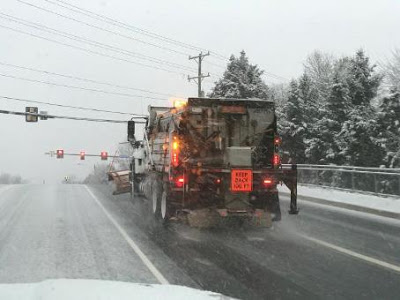Winter road salt pollutes waterways
 |
| VDOT crews use salt and plows to clear know off roads. [VDOT] |
Before the first snowstorm of the season hits, the public is urged to think twice about stocking up on road salt.
Salt dumped on roads, sidewalks, and driveways to melt snow and ice seeps into waterways. Too much salt in streams can kill wildlife and too much salt in drinking water is harmful to people with certain health conditions.
Salt dumped on roads, sidewalks, and driveways to melt snow and ice seeps into waterways. Too much salt in streams can kill wildlife and too much salt in drinking water is harmful to people with certain health conditions.
The Virginia Department of Environmental Quality and Friends of Accotink Creek hosted a “salt listening session” Dec. 3
to educate the public about the harmful impacts of salt.
Will Isenberg, water quality assessment and TMDL coordinator at DEQ, urged people to limit
the use of salt on their property by shoveling as much snow as possible
first. All you need is a cup full of salt on a driveway, he says. And after the snow
is gone, the salt can be swept up and reused.
the use of salt on their property by shoveling as much snow as possible
first. All you need is a cup full of salt on a driveway, he says. And after the snow
is gone, the salt can be swept up and reused.
As an alternative to salt, he
advises homeowners to use birdseed, sand, wood stove ash, or zeolite crystals
to improve traction on snow and ice.
advises homeowners to use birdseed, sand, wood stove ash, or zeolite crystals
to improve traction on snow and ice.
Also, “lower your expectations,” he
suggests. Think about whether it’s really necessary to drive somewhere.
suggests. Think about whether it’s really necessary to drive somewhere.
DEQ recognizes the need to ensure
roads are passable and sidewalks are safe in the winter – people need to get to
work, businesses need to stay open, and emergency vehicles need access. But the
use of salt has unintended consequences, Isenberg says.
roads are passable and sidewalks are safe in the winter – people need to get to
work, businesses need to stay open, and emergency vehicles need access. But the
use of salt has unintended consequences, Isenberg says.
TDML (total maximum daily load) is
a measurement of pollution in waterways. A DEQ study of TMDL in Accotink Creek found
unacceptably high levels of chloride (salt), especially after
snowstorms. Researchers also found big spikes in electrical conductance, which
is caused by salt, in the Long Branch stream in Annandale after snowstorms.
a measurement of pollution in waterways. A DEQ study of TMDL in Accotink Creek found
unacceptably high levels of chloride (salt), especially after
snowstorms. Researchers also found big spikes in electrical conductance, which
is caused by salt, in the Long Branch stream in Annandale after snowstorms.
After coming up with similar
results in other waterways in Northern Virginia, DEQ concluded, “this is a
winter stormwater issue,” Isenberg said.
results in other waterways in Northern Virginia, DEQ concluded, “this is a
winter stormwater issue,” Isenberg said.
DEQ convened 42 organizations –
including the Virginia Department of Transportation, Fairfax Water, local
governments, environmental organizations, citizens associations, and other
stakeholders – to develop a Salt Management Strategy (SaMS) that strikes a
balance between ensuring safe roads in the winter and protecting waterways.
including the Virginia Department of Transportation, Fairfax Water, local
governments, environmental organizations, citizens associations, and other
stakeholders – to develop a Salt Management Strategy (SaMS) that strikes a
balance between ensuring safe roads in the winter and protecting waterways.
By December 2020, the SaMS group
expects to have a toolbox offering alternative, non-salt de-icing techniques
and a suite of best practices for road maintenance professionals, along with
recommendations for government coordinators and planners, researchers, and the
general public.
expects to have a toolbox offering alternative, non-salt de-icing techniques
and a suite of best practices for road maintenance professionals, along with
recommendations for government coordinators and planners, researchers, and the
general public.

